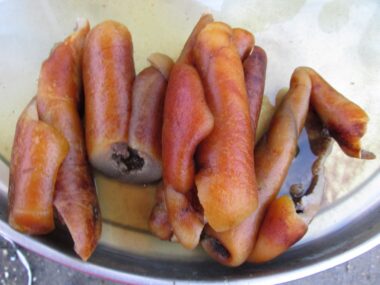Lafun, a traditional Nigerian fermented cassava flour, stands as a cornerstone of Nigerian culinary heritage, particularly prevalent in the southwestern region of the country. With its rich history, unique preparation methods, and versatile culinary applications, Lafun embodies the essence of Nigerian cuisine.
In this exploration, we delve into the origins, preparation techniques, cultural significance, and culinary versatility of Lafun, shedding light on its esteemed place in Nigerian food culture.
Historical Roots and Evolution
The roots of Lafun can be traced back centuries, deeply embedded in the culinary traditions of Nigeria’s diverse ethnic groups. Cassava, the main ingredient of Lafun, has long been cultivated and consumed across Africa for its starchy tubers.
Over time, the indigenous people of Nigeria developed various methods to process cassava into flour, with fermentation emerging as a crucial technique for enhancing its flavour, texture, and digestibility.
Preparation Process

The preparation of Lafun involves several intricate steps, starting with the harvesting and peeling of mature cassava roots. The peeled cassava is then grated or pounded to extract the starchy pulp, which undergoes fermentation to develop its characteristic tangy flavour and airy texture. After fermentation, the cassava pulp is dried and milled into a fine flour, ready for culinary use.
Cultural Significance
Lafun holds significant cultural significance in Nigerian society, serving as a staple food item in everyday meals and festive occasions alike. Its presence in Nigerian cuisine is deeply ingrained, reflecting the country’s rich cultural heritage and culinary diversity.
Lafun is often enjoyed with a variety of savoury dishes, such as soups, stews, and sauces, as well as being a popular choice for street food vendors and snack preparations.
Nutritional Value and Health Benefits
From a nutritional standpoint, Lafun offers a range of benefits, owing to its high carbohydrate content, dietary fibre, and essential nutrients.
The fermentation process enhances the bioavailability of nutrients and promotes the growth of beneficial bacteria, contributing to improved gut health and digestion. Additionally, Lafun is naturally gluten-free, making it suitable for individuals with gluten sensitivities or celiac disease.
Culinary Versatility
One of the defining features of Lafun is its versatility in culinary applications. Whether used as a base for traditional Nigerian dishes or incorporated into contemporary recipes, Lafun adds depth of flavour and texture to a wide range of preparations.
It can be shaped into flatbread-like discs, rolled into dumplings, or fried into crispy fritters, showcasing its adaptability in various cooking styles and flavour profiles.
Regional Variations and Traditions
Across Nigeria, different regions have their variations of Lafun, each reflecting local ingredients, preferences, and culinary traditions.
In the southwestern region, Lafun is often enjoyed with hearty soups and stews, such as Egusi soup or Ewedu soup, while in the northern regions, it may be paired with spicy sauces or grilled meats.
Each variation offers a unique taste experience, rooted in the cultural heritage of its respective region.
Challenges and Preservation Efforts
Despite its cultural significance, Lafun faces challenges in the modern era, including changes in agricultural practices, urbanization, and market competition from processed food products. Efforts are underway to preserve traditional methods of Lafun production, support local farmers, and promote sustainable sourcing practices.
Additionally, initiatives aimed at raising awareness about the nutritional value and cultural importance of Lafun are helping to ensure its continued presence in Nigerian cuisine.
Conclusion
Lafun stands as a symbol of Nigerian culinary heritage, embodying centuries of tradition, innovation, and cultural exchange.
Its unique preparation methods, versatile culinary applications, and rich flavour profile make it a beloved staple in Nigerian households and a source of pride for the country’s diverse communities.
As Nigeria continues to embrace its culinary roots and celebrate its cultural diversity, Lafun remains an enduring symbol of resilience, creativity, and shared culinary traditions.
Related Tags
Taiwo Olawuyi
Taiwo Olawuyi is a highly dedicated and passionate professional blogger, renowned for her ability to create captivating, informative, and engaging content in the realm of health and wellness. She holds a Bachelor's degree in Political Science from Olabisi Onabanjo University and a Master's degree in Adult Education from the prestigious University of Ibadan. Her profound passion for health and wellness, coupled with her unwavering dedication to her audience, serves as a constant source of inspiration and enlightenment for readers worldwide.










